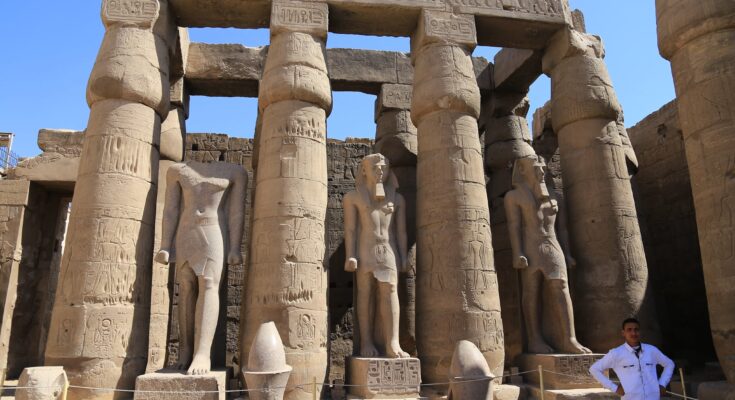For the majority of Egypt’s Pharaonic history, Greece and Egypt had very little to do with each other. There is limited evidence for trade, and certainly not much evidence for regular travel between the two countries. However, in the seventh century BC, everything changed. For that time on, the two countries became firmly intertwined. The Greeks started settling in Egypt extensively. But how did this happen?
The Background to the Arrival of the Greeks in Egypt
There are some legends of Greeks arriving in Egypt around the era of the Trojan War. For example, there is a legend of Menelaus and his men visiting that country and staying there for eight years on their way back from Troy. There are also some researchers who think that the Sea Peoples were partly Greeks, although that is controversial. However, the earliest definitely-historical account of Greeks arriving in Egypt comes from Herodotus.
Herodotus wrote about the reign of Psamtik I. This king of Egypt started his reign in the first half of the seventh century BC. He ruled during a troubled period of Egypt’s history. The dynasty of Ethiopian kings of Egypt had been pushed to the south by the Assyrians. The Assyrians then installed Psamtik I as their client king over the north of the country.
Psamtik I thus had a precarious position. The southern Ethiopian dynasty had just recently killed his father. And despite Psamtik having the backing of Assyria, their homeland was far away. Plus, there were other kings ruling over small parts of northern Egypt at the same time.
The Arrival of the Men of Bronze
Herodotus explains that Psamtik received some very good fortune right at the beginning of his reign. According to his account, this is what happened:
“Ionians and Carians, voyaging for plunder, were forced to put in on the coast of Egypt, where they disembarked in their armor of bronze; and an Egyptian came into the marsh country and brought news to Psammetichus (for he had never before seen armored men) that men of bronze had come from the sea and were foraging in the plain.”
So according to this, Greek ‘men of bronze’ arrived in Egypt at the start of the reign of Psamtik I. And how did Psamtik react to these new arrivals? Herodotus goes on to explain that he employed them as mercenaries. This helped to strengthen his position over northern Egypt.
How the Greeks Changed the Course of Egyptian History
Psamtik I was the founder of the 26th Dynasty of Egypt. This was the last native dynasty of Egypt before it was entirely conquered by the Persians in 525 BC. If the interaction between the kings of Egypt and outside nations had gone differently over the century and a half between Psamtik I and the year 525 BCE, then perhaps the Persians would not have ended up invading.
Therefore, the fact that Psamtik I was able to establish a dynasty in the first place is something of extreme importance to the subsequent history of Egypt. What was it, then, that enabled him to establish a strong position over Egypt? It was his Greek mercenaries.
The records reveal that, largely as a result of his Greek and Carian mercenaries, Psamtik was able to conquer the entire Delta region. Then his rule spread southwards, until, after just one decade of rule, he had taken over control of all of Egypt.
The Development of Greek Settlements in Egypt
King Psamtik of Egypt obviously greatly appreciated the support he had from his Greek mercenaries. He had no desire to lose his hold on them or have them return to their homelands. Therefore, he gave these Greeks a new home in Egypt. He settled some of these Greeks in Tahpanhes, a city near the eastern border of Egypt. He settled others in the south of Egypt, in the city of Elephantine, right near the border of Egypt and Nubia.
Thus, it seems that the first settlements of Greeks in Egypt were strategically placed to protect the borders of the country.
However, by far the most important early Greek settlement in Egypt was Naucratis. This city was founded in the north of Egypt by Greeks in the seventh century BCE. It was a trading city, allowing the Greeks to trade with other nations from the Delta of Egypt.
The Importance of Naucratis
According to Herodotus, it was Amasis II (sixth century BC) who gave Naucratis to the Greeks. The archaeological evidence shows that the Greeks were already there in the seventh century, but perhaps Amasis placed more Greeks there, or gave them greater autonomy.
In any case, the evidence clearly shows that Naucratis came to be a major Greek city in Egypt. It was the one port in Egypt of which the Greeks were allowed full control, and they certainly utilized it to the full. They used it to trade with numerous Greek cities. From Herodotus and other evidence, we see that this city in Egypt traded with Greek locations such as Miletus, Chios, Rhodes, Aegina, Samos, Halicarnassus, and various others.
Because of Naucratis, Greeks began flocking to Egypt. The two countries started exchanging ideas and cultural concepts. The influence went both ways. Both nations flourished culturally due to this Greek colony. Therefore, the history of both nations may have turned out rather differently if those first Greek ‘men of bronze’ had not landed in Egypt in the reign of Psamtik I.



